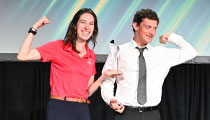Every Friday night before the following day’s meet, the Shorewood (Wisconsin) High School cross country team would circle up at a pasta party to discuss the next day’s goals. Whether it was to keep his shoelaces tied or to finish the race, Collin Brusnahan expressed his goals and followed through.
He wasn’t always the first to reveal his goals for the upcoming meet.
Oftentimes, the team would go around in a circle, each person discussing his goal for the next day. If Collin wasn’t ready, his teammates would skip him. Eventually, he said he was ready to announce his goal. Sometimes he would copy what other teammates said just to fit in.
At first, his objectives were simple: He wanted to make sure his shoelaces were tied, and he wanted to make sure he would be able to finish the race.
Brusnahan, a high school sophomore, is afflicted with autism. Autism is a brain development disorder that impairs social interaction and communication, and causes restricted and repetitive behavior.
Instead of being asked questions, Brusnahan would rather ask the questions.
Transition can be very difficult for individuals with autism. Running cross country required Collin to show up and practice at the high school a few weeks before school started.
“This worked out great because he was able to become comfortable on the school grounds before school started,” said his mother, Lynn Stansberry-Brusnahan.
Although he joined the team, Brusnahan never really grasped the concept of competition. One of his simple goals developed when his shoelace came untied.
He didn’t stop; he just kept going. Next time, he wanted to keep his shoelaces tied.
His coach, Dominic Newman, was first introduced to Brusnaham when he was in elementary school.
“Since I am an elementary school teacher, I have known Collin since he was in the third grade,” Newman said. “But then I had to teach a class at the middle school, and we were able to reformulate that bond between us when he was in seventh grade. “Over the summer I saw him at a bike race, and I asked him to come out for the team. I didn’t really think he was going to run, but I thought it was a really great social network. Generally, cross country is an excellent sport for that."
Bresnahan did come out for the team. Rather than acting as the team manager by distributing water bottles and handing out towels, Brusnahan was running.
“Cross country is a great sport for an individual who thrives on routine. All of the runners start in the same spot and finish at the same place,” Stansberry-Brusnahan said. “They all run the same route – it is easy to figure out.”
However, teammates were leery of Brusnahan running through the various trails.
“Shorewood is like a small city, and the paths are pretty familiar,” Newman said.
Still, teammates would run behind him during practice, just to ensure that Brusnahan would not stray off the path. As the season progressed, Brusnahan unveiled more of his goals to his teammates and friends. He was still timid at the pasta dinners, but those events helped him socialize and acquaint himself with his peers.
One Friday, Brusnahan showed up at the dinner before everyone else did. The host was a mother who he did not know, and she did not know about his autism. Once his teammates were around, he was very engaging. Normally, it takes him about two or three weeks to engage in conversation or to trust a person.
Whether it was running or playing video games with the guys, Brusnahan belonged to a group.
“Once the team saw that Collin really want to succeed, they joined him in that goal. This team’s attitude toward Collin really shows the importance of inclusion of individuals with special needs in mainstream environments,” Brusnahan said.
As the season progressed, Brusnahan announced he had a competitive goal. At one of the Friday evening events, he stated he wanted to run the 5,000-meter course in less than 24 minutes. Finishing the course in 23:49, Brusnahan was able to achieve that goal.
Even though the cross country season came to an end, the track season began in the spring and Brusnahan took that opportunity as well.
“One of the biggest steps we noticed is that he likes to be around people he knows well,” Newman said. “There was a major stepping stone last year when we went to track. Since he had been accustomed to cross country running, we thought he would gravitate toward the distance crew. Collin didn’t want to do that, he wanted to go to the sprint coach – and all the guys saw that.
Because Brusnahan is autistic, the coach had to be informed about his disabilities.
“We had to explain to the sprint coach that Collin was autistic, but he trained him like he was any other runner,” Newman said.
“When Collin first started track, it was a little intimidating – there were lots of different events happening at once. Coach Newman really went the extra yard to ensure Collin was supported in whatever he needed to succeed,” Brusnahan-Stansberry said.
Emily Cerling
Emily Cerling was a fall semester intern in the NFHS Publications/Communications Department.
Most Recent Articles
- nfhs news NFHS Learning Center Delivers 25 Millionth Course
- Track & Field/Cross Country article Effective Communication with Athletes and Coaches
- nfhs news Player Equipment Changes Highlight 2025 High School Football Rules Revisions
- Player Equipment Changes Highlight 2025 High School Football Rules Revisions
- nfhs news Judgment Call on Second Contact Eliminated in High School Volleyball







